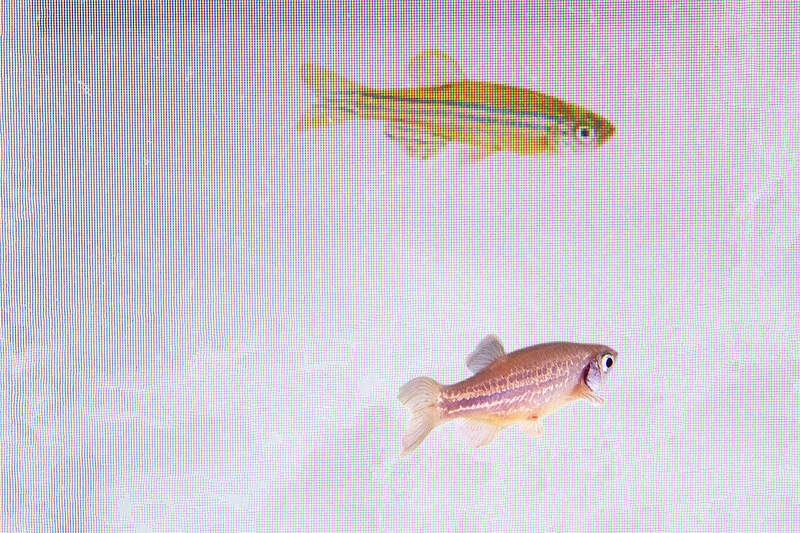Our capacity to care about others may have very, very ancient origins, a new study suggests.
It might have been deep-rooted in prehistoric animals that lived millions of years ago, before fish and mammals like us diverged on the tree of life, according to researchers who published their study Thursday in the journal Science.
“Some of the mechanisms that underlie our ability to experience fear, or fall in and out of love, are clearly very ancient pathways,” said Hans Hofmann, an evolutionary neuroscientist at the University of Texas at Austin, who was not involved in the research.

Photo: AP
Scientists are usually reluctant to attribute humanlike feelings to animals. But it’s generally accepted that many animals have moods, including fish.
The new study shows that fish can detect fear in other fish, and then become afraid too — and that this ability is regulated by oxytocin, the same brain chemical that underlies the capacity for empathy in humans.
The researchers demonstrated this by deleting genes linked to producing and absorbing oxytocin in the brains of zebrafish, a small tropical fish often used for research. Those fish were then essentially antisocial — they failed to detect or change their behavior when other fish were anxious.
But when some of the altered fish received oxytocin injections, their ability to sense and mirror the feelings of other fish was restored — what scientists call “emotional contagion.”
“They respond to other individuals being frightened. In that regard, they behave just like us,” said University of Calgary neuroscientist Ibukun Akinrinade, a co-author of the study.
The study also showed that zebrafish will pay more attention to fish that have previously been stressed out — a behavior the researchers likened to consoling them.
Previous research has shown that oxytocin plays a similar role in transmitting fear in mice.
The new research illustrates “the ancestral role” of oxytocin in transmitting emotion, said Rui Oliveira, a behavioral biologist at Portugal’s Gulbenkian Institute of Science and a study co-author.
This brain processing “may have already been in place around 450 million years ago, when you and me and these little fish last had a common ancestor,” explained Hofmann.
Oxytocin is sometimes thought of as a “love” hormone, but Hofmann said it’s actually more like “a thermostat that determines what is socially salient in a particular situation — activating neural circuits that may make you run from danger, or engage in courtship behavior.”
That could be fundamental to the survival of many animals, especially those who live in groups, said Stony Brook University ecologist Carl Safina, who was not involved in the study.
“The most basic form of empathy is contagious fear — that’s a very valuable thing to have to stay alive, if any member of your group spots a predator or some other danger.”

As Donald Trump’s executive order in March led to the shuttering of Voice of America (VOA) — the global broadcaster whose roots date back to the fight against Nazi propaganda — he quickly attracted support from figures not used to aligning themselves with any US administration. Trump had ordered the US Agency for Global Media, the federal agency that funds VOA and other groups promoting independent journalism overseas, to be “eliminated to the maximum extent consistent with applicable law.” The decision suddenly halted programming in 49 languages to more than 425 million people. In Moscow, Margarita Simonyan, the hardline editor-in-chief of the

Six weeks before I embarked on a research mission in Kyoto, I was sitting alone at a bar counter in Melbourne. Next to me, a woman was bragging loudly to a friend: She, too, was heading to Kyoto, I quickly discerned. Except her trip was in four months. And she’d just pulled an all-nighter booking restaurant reservations. As I snooped on the conversation, I broke out in a sweat, panicking because I’d yet to secure a single table. Then I remembered: Eating well in Japan is absolutely not something to lose sleep over. It’s true that the best-known institutions book up faster

The latest Formosa poll released at the end of last month shows confidence in President William Lai (賴清德) plunged 8.1 percent, while satisfaction with the Lai administration fared worse with a drop of 8.5 percent. Those lacking confidence in Lai jumped by 6 percent and dissatisfaction in his administration spiked up 6.7 percent. Confidence in Lai is still strong at 48.6 percent, compared to 43 percent lacking confidence — but this is his worst result overall since he took office. For the first time, dissatisfaction with his administration surpassed satisfaction, 47.3 to 47.1 percent. Though statistically a tie, for most

Though the total area of Penghu isn’t that large, exploring all of it — including its numerous outlying islands — could easily take a couple of weeks. The most remote township accessible by road from Magong City (馬公市) is Siyu (西嶼鄉), and this place alone deserves at least two days to fully appreciate. Whether it’s beaches, architecture, museums, snacks, sunrises or sunsets that attract you, Siyu has something for everyone. Though only 5km from Magong by sea, no ferry service currently exists and it must be reached by a long circuitous route around the main island of Penghu, with the